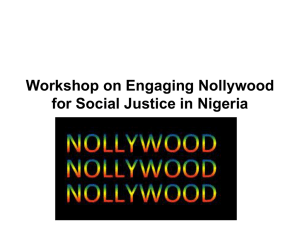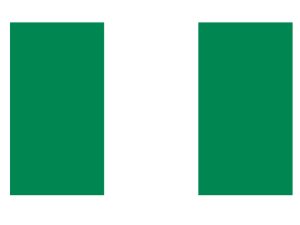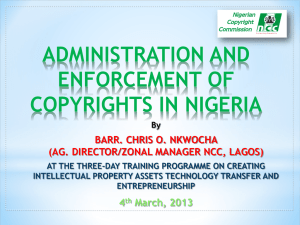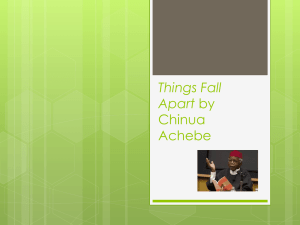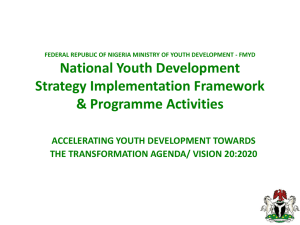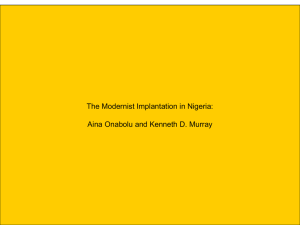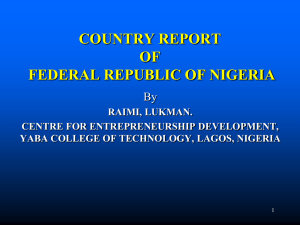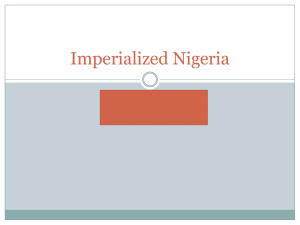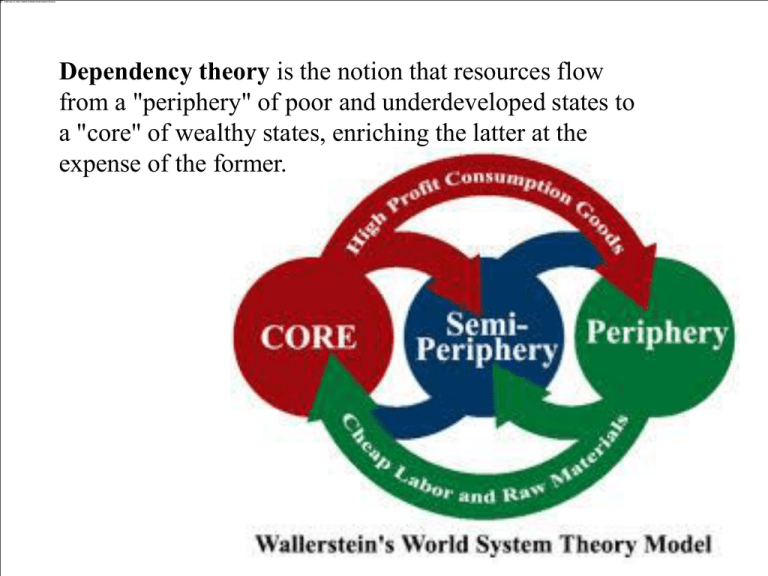
Dependency theory is the notion that resources flow
from a "periphery" of poor and underdeveloped states to
a "core" of wealthy states, enriching the latter at the
expense of the former.
NIGERIA AP GOV 2014-2015
Really good history in 2 parts
https://www.youtube.com/watch?v=xwHMbdbWMtU
https://www.youtube.com/watch?v=VNp9qVmQ5do
Nigeria . . . A study in
Democratic Consolidation
Nigeria elections: Obasanjo quits PDP after
criticising Jonathan http://www.bbc.com/news/worldafrica-31502168 . . . Read paragraphs about military . .
. And look at vocab
Nigerian vote delay prompts suspicion of election rigging,
worries of violence
The People's Democratic Party is a centrist political party in Nigeria. It won the
Presidential elections of , 2003, and 2007, and 2011 and is the dominant party in the
Fourth Republic.
The PDP favors free-market policies which support economic liberalism, and limited
government regulation.
In The PDP strives to maintain the status quo on oil revenue distribution.
Though the PDP government setup the Niger Delta Development Commission (NDDC)
to address the needs of the oil-producing Niger Delta states, it has rebuffed repeated
efforts to revert back to the 50% to 50% federal-to-state government revenue allocation
agreement established in 1966.
Social issues
The PDP is against same sex relations, and favors social conservatism on moral and
religious grounds. In 2007, the PDP-dominated National Assembly sponsored a bill to
outlaw homosexual relations, making it punishable by law for up to five years in prison
On the other hand, the PDP adopts a more leftist stance towards poverty and welfare. In
2005, President Obasanjo launched Nigeria's first National Health Insurance Scheme
(NHIS) to ensure that every Nigerian has access to basic health care services
The All Progressives Congress
(APC) is a social-democratic[2]
political party in Nigeria, formed
on 6 February 2013 in anticipation
of the 2015 elections
Formed in February 2013, the party is the result of an alliance by Nigeria's three
biggest opposition parties – the Action Congress of Nigeria (ACN), the Congress
for Progressive Change (CPC), the All Nigeria Peoples Party (ANPP) - and a
faction of the All Progressives Grand Alliance (APGA) – merged to take on the
People's Democratic Party.[6][7] The resolution was signed by Tom Ikimi, the
current spokesman for the party, who represented the ACN; Senator Annie
Okonkwo on behalf of the APGA; former governor of Kano State, Mallam
Ibrahim Shekarau, the Chairman of ANPP's Merger Committee; and Garba Sadi,
the Chairman of CPC's Merger Committee.[8]
The party received approval from the nation's electoral umpire Independent
National Electoral Commission (INEC) on 31 July 2013 to become a political
party and subsequently withdrew the operating licenses of the three previous and
merging parties (the ACN, CPC and ANPP
Resources on Boko Haram
John Green: Understanding Boko Haram
https://www.youtube.com/watch?v=WSDRF7VGmIs
Other resources if you want more:
Need To Know: What is driving Nigeria's Boko Haram?
http://www.bbc.com/news/world-africa-17790002
2 minute video BBC
Who are Boka Haram
https://www.youtube.com/watch?v=8VN_7A3mNKg
Nov 11, Al Jazeera 28 minutes
8 February 2015 Last updated at 20:29 ET
Nigeria elections: Mapping a nation divided
Nigeria is Africa's biggest oil producer and most populous country but poverty is widespread and the country is in the grip of a violent
uprising by Islamists Boko Haram. The BBC maps the country's
divisions ahead of its postponed elections.
See maps:
http://www.bbc.com/news/world-africa-31101351
.Nollywood—17 minute video
http://www.thisisnollywood.com/nollywood.htm
2 mins VOA August 2014:
http://www.voanews.com/content/nigeria-nollywoodmovie-industry-rolls-at-high-gear/2423930.html
Ted talk:
http://www.ted.com/talks/franco_sacchi_on_nollywood
Article:
A Scorsese in Lagos
The Making of Nigeria’s Film Industry
http://www.nytimes.com/2012/02/26/magazine/nollywood-movies.html?pagewanted=all&_r=0#comments
https://www.youtube.com/watch?v=xWzAZ6E2sFw
Nigeria is a good example of REGIME change
_______ _________: a sudden shock to state policy involving deliberate
violation of constitutional reforms by a group of persons in authority; a
quick and decisive seizure of governmental power by a strong military or
political group.
In contrast to a r____________, a coup does not involve a mass uprising.
Rather, in a typical coup, a small group of politicians or generals arrests
the incumbent leaders, seizes the national radio and television services
and proclaims itself in power.
French for stroke of the state or blow to the government
Elections
Do you get it????
In _________ the 4th republic begins when ____________
was elected first president. Nigeria made its first
transition from one elected government to another when
Obasanjo won a second term in April ________ (year)
(1999 plus 4) The ruling ___________ (party) also
dominated the legislative elections, winning 76 of 109
___________seats and 223 of 360 House seats
But Then . . . .
Questions about Elections April
2007
Will Nigeria make it through a
third presidential election?
The Economist asked: Could
Double-O make it three in a row?
What was the issue???
On May 16, 2006 the Nigerian Senate voted to block a constitutional amendment
which would have allowed its president to serve more than two terms in office.
Next election : Do you get it????
If successfully completed, the _______(year) presidential
election will mark Nigeria's first peaceful handover from
one democratically elected president at the end of his
constitutional term to the next.
The most recent failed election was the 1993 election of M. K.
O. Abiola, which was annulled by Ibrahim B_________the
military dictator ruling at the time. General Sani
________eventually seized power, and when Abiola tried to
claim his presidency, he was imprisoned until his
questionable death in 1998.
Do you get it????
The Nigerian general elections of 2007 were held on 14 April and 21
April 2007. Governorship and state assembly elections were held on 14 April,
while the presidential and N__________ A___________elections were held a week
later on 21 April. Umaru _____ _______won the highly controversial election for
the ruling __________ __________ Party and was sworn in on 29 May.
President Olusegun Obasanjo could not pursue a third term. Additionally he was
unsupported by Atiku Abubakar, his vice-president. Presidential candidates were
announced in late December 2006, and 50,000 assault rifles were ordered to help
the military maintain order during the election. Umaru Yar'Adua contested the
election for the ruling People's Democratic Party (PDP), and the opposition All
Nigeria Peoples Party (ANPP) chose Muhammadu Buhari. Atiku Abu-Bakr, the
current Vice-President, announced on 25 November 2006 that he would contest the
election, and he subsequently became the presidential candidate of the Action
Congress in December.
Results of Election
http://africanelections.tripod.com/ng.html#2007_National_Assembly_Election
Results: A First in Nigeria: A Peaceful
__________of Power
Nigeria’s new
president, Umaru
Yar’Adua, took
office Tuesday in
Abuja. After a
history of military
coups, Mr.
Yar’Adua’s
inauguration was
the country’s first
peaceful transition
of power between
civilians
ABUJA, Nigeria, May 29 (AP) — This time, the shots were fired in celebration.
For the first time in Nigeria’s coup-riddled history, power passed between two civilians, as
the army hailed the new president, Umaru Yar’Adua, with a 21-gun salute on Tuesday
THEN . . . .
President Yar'adua dies and
Nigeria power struggle begins
Nigeria President Umaru
Yar’Adua died late Wednesday
and his former vice president,
Goodluck Jonathan, was sworn
in today.
But will Jonathan run again in
next year's election, or follow
Nigeria's tradition of rotating
the presidency between north
and south?
By Scott Baldauf, Staff writer /
May 6, 2010
Nigeria's acting president, Goodluck Jonathan
(right), takes the oath of office in front of chief
justice Aloysius Katsina-Alu (left), to become
the nation's next leader, at the presidential villa
in Abuja, Nigeria, Thursday. Jonathan was
sworn in, just hours after the death of President
Umaru Yar’Adua
ZONING
The late Nigerian President Umaru Yar'Adua came to power in 2007
Since the return of civilian rule in 1999, the ruling and dominant People's Democratic Party (PDP) has
sought to rotate, or "zone" the office of president between the overwhelmingly Muslim north and the
mainly Christian south. Under this plan, the Mr Yar'Adua was supposed to be the northern president who
would follow the two terms (1999-2007) served by the southerner Olusegun Obasanjo.
But fate dealt the plan a blow with Mr Yar'Adua's death from a long illness - and the subsequent accession to
the presidency of another southerner, the former Vice-President Goodluck Jonathan. The handover to
President Jonathan was entirely peaceful, legal and constitutional. But it has broken the deal planned by the
godfathers of the powerful PDP. So some northern leaders are complaining that President Jonathan should
not seek to stand as the PDP candidate in elections next year.
The issue of power rotation is enshrined in the PDP's constitution," a leading northern politician, Atiku
Abubakar, told me in his sumptuous, almost palatial Abuja home. Referring to the deal within the PDP
in the late 90s which saw Mr Obasanjo stand on the party's presidential ticket, Mr Abubakar said: "It was
agreed that the presidency should be retained in the south" for eight years.
"And that when it reverts to the north it should also remain there for eight years. In fact there was a vote. I
was there. And to the best of my knowledge that position has not been reviewed - so that is what it is today."
Facebook launch
On 29 June 2010,
President Jonathan became
the first serving Nigerian
president to launch a
Facebook page. He stated
that this action was part of
fulfilling a promise he had
made earlier to interact
more with Nigerians.[
2011 presidential campaign and elections
On 15 September 2010, Jonathan announced on the social media
website, Facebook that he had decided to run for his first ever
political election to hold public office as President of Nigeria in
2011
Parliamentary
Elections April
2011
(Reuters) - Nigeria postponed parliamentary elections until
Monday after voting materials failed to arrive in many areas, a
major blow to hopes of a break with a history of chaotic polls
in Africa's most populous nation.
Voters had trooped early to polling stations across the country
of 150 million, eager for a ballot less tainted by fraud and
violence than 2007 elections that lacked credibility in the eyes
of Nigerians and international observers
Electoral system: http://www.ipu.org/parline/reports/2363_B.htm
Women in parliament http://www.ipu.org/wmn-e/classif.htm
And then the
Presidential
election is held . .
. .Lines are long
again
Queues in Lagos have been long, despite the heat (Photo
sent in by BBC Hausa listener Ubale)
One woman wore a dress
showing the portrait of
the first lady, Patience
Jonathan, in the queue in
Otuoke
Remember the highlights from this article http://www.bbc.co.uk/news/world-africa-12941582
The Executive Branch
• Popularly elected (like the US he chooses and runs with a VP);
• Head of state and government (he and his ministers may not
simultaneously serve in the National Assembly);
• Commander-in-chief of the armed forces;
• Serves a four year FIXED term ( maximum of two terms);
• Performs ceremonial duties of leadership;
• Veto (subject to 2/3 override)
• Oversees the daily administration of gov’t
• Coordinates/ oversees armed forces; C in C
• Appoints gov’t ministers (confirmed by
Senate);
• The President and his ministers make up a
Federal Executive Committee (assure that
enacted laws are properly implemented)
Exec Leg relations
In spite of a more than two-thirds majority control of the Assembly by the ruling
PDP)the PDP government led by Olusegun Obasanjo and the Assembly have been
known more for their disagreements than for their cooperation. President Obasanjo has
been accused of interference in the Assembly's affairs while the Assembly's PDP
members have actively supported two impeachment attempts by opposition
legislators.
The Senate also refused to amend the Constitution to allow double O to go 3 in a row.
Nigeria: Impeachment Threat - We
Can't Be Blackmailed, Reps Warn
By Edegbe Odemwingie, Adesuwa Tsan, Gabriel Ewepu, and Muazu
Elazeh, 24 July 2012
http://allafrica.com/stories/201207240149.html
http://africanelections.tripod.com/ng.html#2007_Natio
nal_Assembly_Election
Women in Politics
Country
Rank
*
Lower or Single House
Elections
United States
71
Upper House or Senate
Seats
Women
%W
Elections
Seats
Women
%W
435
74
1.3%
11 2014
100
17
20%
11 2014
United Kingdom
60
05 2005
646
127
19.7%
N/A
721
126
17.5%
Russia
82
12 2007
447
63
14%
N/A
178
8
4.7%
China
52
03 2008
2987
637
21.3%
---
---
---
---
Iran
129
03 2008
286
8
2.8%
---
---
---
---
Mexico
43
07 2006
500
116
23.2%
07 2006
128
23
18%
Nigeria
116
04 2011
360
25
6.7
%
04 2011
109
9
4
6.7%
•
•
•
•
The Judiciary
Interpret the laws;
Supreme Court is at the apex;
Court of Appeals and a Federal High Court;
The Capital of Abuja has a High Court, Sharia Court of
Appeal, and Customary Court of Appeal
• Also state courts (federal system) which deal with most
criminal law
• Legal system based on English common law, Islamic law
(in 12 northern states), and traditional law; accepts
compulsory ICJ jurisdiction with reservations
The Supreme Court is composed of the Chief ________ and not more than thirteen
justices, appointed by the President on the recommendation of the National Judicial
Council and subject to confirmation by the Senate. Justices of the Supreme Court must
be qualified to practice law in Nigeria, and must have been so qualified for a period
not less than fifteen years. Justices of the Supreme Court of Nigeria have a mandatory
retirement age of 70 years
Nigeria sup ct http://www.youtube.com/watch?v=sDou6_eNzok
27 January 2012 Last updated at 10:12 ET
Supreme Court dismisses five governors
The governors had all won re-run elections a year after their initial victories in
2007 were annulled
Nigeria's Supreme Court has ordered five of the country's powerful state
governors to step down immediately.
It marks the end of a long legal battle about when exactly their terms in office,
which last four years, began.
They were from the ruling People's Democratic Party, winning polls in 2007 in
Bayelsa, Cross River, Kogi, Adamawa and Sokoto and vote re-runs in 2008.
The BBC's Fidelis Mbah in Lagos says it is a landmark judgement, asserting the authority of the judiciary.
Governors, who can serve no longer than two terms in office, enjoy wide powers in Nigeria.
Some, especially in oil-producing areas, control bigger budgets than those of national governments in some neighbouring West African
countries.
'Stopping culture of impunity'
The five governors affected by the ruling had all won re-run elections a year after their initial victories in 2007 were annulled because of
irregularities.
Last year, a lower court had exempted them from having to face elections in April 2011, saying their tenures had started in 2008.
But Supreme Court Judge Walter Onnoghen said on Friday: "To allow the governors seeking tenure elongation will allow a culture of
impunity in the system", AFP news agency reports.
Our correspondent says the speakers of the respective state House of Assemblies will assume the governorships in Bayelsa and Cross River
states in the south and Sokoto and Adamawa in the north until elections are held later in the year.
The central state of Kogi already has a governor-elect following elections in December, as the sitting governor was serving his last term in
office.
Liyel Imoke, the outgoing governor of Cross River, said on the social networking site Facebook that he had already vacated his office.
He will be running for a second term and appealed for "calm and peace in the state"
Nigeria is a Federal State
Nigerian states that implement
some form of sharia law (in green)
From
Occupy
Nigeria
website
CIA Factbook: Religions--Muslim 50%, Christian 40%, indigenous
beliefs 10% --statistics vary—remember the census?
English: official language
More good charts and graphs from the Economist
http://www.economist.com/blogs/graphicdetail/2015/
02/nigerias-postponedelection?zid=304&ah=e5690753dc78ce91909083042
ad12e30
Mosque in Abuja
Church in Abuja
http://www.bbc.co.uk/news/world-africa12893448
Nigeria: a nation divided
Elections in __________ (year)
2011 Gubernatorial election results
Remember electoral system: In first round, need an absolute __________and
at least ______in two-thirds of the states is required for a candidate to be
elected in the first round.
“Federal Character” Principle:
14. (1) The Federal Republic of Nigeria shall be a State based
on the principles of democracy and social justice.
...
(3) The composition of the Government of the Federation or
any of its agencies and the conduct of its affairs shall be
carried out in such a manner as to reflect the federal
character of Nigeria and the need to promote national
unity, and also to command national loyalty, thereby
ensuring that there shall be no predominance of persons
from a few State or from a few ethnic or other sectional
groups in that Government or in any of its agencies.
ZONING
A gentlemen's agreement, within the ruling Peoples
Democratic Party (PDP), meant that power rotates between
the predominantly Muslim north and Christian south every
two terms, which means the flag bearer of the party for this
election was scheduled to be represented by a Northerner.
After the death of President Umar Yar'Adua, a Northern
Muslim, his Vice President Goodluck Jonathon, a Southern
Christian, took over as acting president. The suggestion that
Jonathan was considering running for the presidency in his
own right was controversial as Yar'Adua had only served one
of the two possible terms as president after Southerner
Olusegun Obasanjo
In May 1967 the Igbo dominated Eastern Region seceded from Nigeria,
declaring itself the Republic of Biafra. Although the Biafrans were
outnumbered and outgunned, they held off the Nigerian military for three years,
helped in part by international support, which believed that the Nigerian
government was conducting a genocidal war against the Igbo. Azikiwe, who had
been dismissed from his post by the military government, became a prominent
supporter of Biafran independence. Biafra was defeated in 1970. Although this
did not lead to the Igbo extermination that many feared, the war itself exacted
huge costs in terms of military and civilian life—estimates range from 500,000 to
as high as three million
GO to:
http://news.bbc.co.uk/onthisday/hi/dates/stories/
june/30/newsid_3733000/3733321.stm
Evid of Centralization or Decentralization?
Twelve northern Nigerian states have
introduced Sharia since the year 2000.
The move initially heightened tensions
between Muslims and Christians and
led to clashes which left thousands
dead.
Safiya Husseini,
acquitted after death
sentence for adultery
SHARIA LAW
Many
amputations
sentences
have not
been carried
out
Sharia was
very popular
in the north
when
introduced
A sign in Kano reminds visitors that religious law is in place throughout
the state and that they should "take heed."
Girls in Kano, Nigeria, attend a hybrid school that combines
Islamic education with secular subjects like math and reading
New programs have sprung up to encourage parents to send their
daughters to hybrid public elementary schools that offer traditional
Islamic education along with math and reading. In many of these
classes girls outnumber boys
Social Movements
Initially as spokesperson, and then as President, of the
Movement for the Survival of the Ogoni People
(MOSOP), Saro-Wiwa led a nonviolent campaign
against environmental damage associated with the
operations of multinational oil companies, especially
Shell.
He was executed by the Nigerian Military in 1995, his
death provoking international outrage
Members of Movement for the
Emancipation for the Niger Delta.
Photo: George Osodi/AP
Lawsuit:
https://www.youtube.com/watch?v
June 9, 2009
Shell to Pay $15.5 Million to Settle Nigerian Case
By JAD MOUAWAD New York Times
GO TO:
http://www.theguard
ian.com/world/2009/
jun/08/nigeria-usa
Ken Saro-Wiwa Jr. sued Royal Dutch Shell, saying it had culpability in his father’s death.
Militants from the
Movement for the
Emancipation of the
Niger Delta patrolling the
delta. Photographs by
Michael Kamber
The Movement for the Emancipation of the Niger Delta
("MEND") is a militant indigenous people's movement
dedicated to armed struggle against the exploitation and
oppression of the people of Niger Delta and the degradation of
the natural environment by foreign multinational corporations
involved in the extraction of oil in the Niger Delta and the
Federal Government of Nigeria. MEND has been linked to
attacks on foreign owned petroleum companies in Nigeria.
SEE: https://www.youtube.com/watch?v=D_Sg8sXjJcM
http://www.vanityfair.com/politics/features/2007/02/junger200702
The Economist has described the organization as one that "portrays
itself as political organisation that wants a greater share of
Nigeria’s oil revenues to go to the impoverished region that sits
atop the oil. In fact, it is more of an umbrella organisation for
several armed groups, which it sometimes pays in cash or guns to
launch attacks."
http://www.youtube.com/watch?v=1ds0ppu791w mend
amnesty
A trash dump in Lagos, Nigeria. By some estimates, misrule has cost the national treasury
$400 billion in theft and waste
Nigeria Tries to ‘Sanitize’ Itself of Gays
By ADAM NOSSITERFEB. 8, 2014
http://www.nytimes.co
m/2014/02/09/world/af
rica/nigeria-uses-lawand-whip-to-sanitizegays.html?_r=0
A bailiff in Bauchi, in mostly Muslim northern Nigeria, reenacted the lashing of a man convicted of homosexuality. Credit
Benedicte Kurzen for The New York Times
OIL
Almost of all of Nigeria's current production comes from the onshore Nige
Delta region shown here.
Nigeria Economy Feb 2015; http://www.reuters.com/video/2015/02/18/oil-
Nigeria’s Economy
Nigeria could become Africa's biggest economy
BBC explains
http://www.bbc.com/news/business-26881375
Needle on Zero: Nigeria's Economy Tanking as
U.S. Oil Exports Dry Up
NBC News Nov 29, 2014
When the terrorist group Boko Haram kidnapped more than 250 Nigerian
schoolgirls last spring, many news reports noted that Nigeria had long been
one of the biggest suppliers of oil to the United States, suggesting that
economic relationship gave Washington a strong incentive to help track down
the kidnappers.
That was wrong.
In April, the same month the girls were snatched from an elementary school
in Chibok, only 4.5 million barrels of Nigerian oil arrived at U.S. ports, down
from a record high of 40 million barrels seven years earlier.
And by July, the spigot was shut off completely. Over the next six weeks, not
a single drop of Nigerian light, sweet crude arrived in the U.S. - all of it
replaced at Gulf Coast refineries by fracked oil from fields like the Bakken
formation in North Dakota and Eagle Ford in Texas
Organization of the Petroleum Exporting Countries
A Rentier State
A state that derives a substantial portion of its revenue on a regular basis from payments
by foreign concerns in the form of rents (extraction fees): a subsystem of rentier
economy, which is an economy heavily supported by state expenditure, while the
state itself continually receives rents from abroad. The theory of the “rentier state”
says that countries that receive substantial amounts of oil revenues from the outside
world on a regular basis tend to become autonomous from their societies,
unaccountable to their citizens, and autocratic.
Bonny, site of one of Shell's
.
main oil facilities in Nigeria
Gas Line Explodes in Nigeria, Killing at
Least 260
A man washed soot from his face Tuesday in Lagos, Nigeria, after a gas pipeline ruptured
by thieves exploded. At least 260 people were killed in the blast, which spewed fire and
black smoke. It was the latest oil-industry disaster in Nigeria, Africa’s largest petroleum
producer. Dec 27, 2006
Environmental Damage
Oil bunkering threatens Nigeria’s economy,
environment
http://www.washingtonpost.com/national/oilbunkering-threatens-nigerias-economyenvironment/2013/07/18/e38cb4a0-e27311e2-aef3-339619eab080_story.html
Shell to pay Nigeria locals for 'devastating' oil spill
7 January 2015 Last updated at 03:34 GMT
http://www.bbc.com/news/worldafrica-30706227
100 Feared Dead in Nigerian Pipeline Fire
May 16, 2008 LAGOS, Nigeria — More than 100 people were feared dead on Thursday after a
construction vehicle struck an oil pipeline on the outskirts of Lagos, Nigeria’s biggest city,
setting off an oil-fed inferno that spread to surrounding homes and a school.
In Ijegun, a suburb of Lagos, people tried to stop the spread of an oil-fed fire on Thursday.
Oil company employees are suspected of selling their skills to oil
bunkerers
RESOURCE CURSE
The oil and gas sector accounts for about 35 per cent of gross
domestic product, and petroleum exports revenue represents
over 90 per cent of total exports revenue. Its currency is the
naira
Nigeria Plans Budget Cuts as Oil Price Drop
Erodes Revenue
http://www.bloomberg.com/news/articles/2014-11-16/nigeria-plans-budget-cuts-as-oil-price-drop-erodes-revenue
Nigeria's economy is under pressure from oil price drop
13 February 2015 Last updated at 16:54 GMT
Nigeria is Africa's largest oil producer, pumping over two million barrels a day.
For decades, the country has relied heavily on the oil sector to bring in taxes and
foreign exchange.
But the drop in the oil price has knocked the value of the local currency - the
naira - by nearly 20%.
Those immediately affected are ordinary people, and also the new generation of
investors who only entered the oil and gas businesses in recent years.
Nigeria's postponed election
A powder keg
Economist Feb 8, 2015
Whoever wins the election will have their work cut out. Nigeria's growth has, in recent years, been
fuelled by high oil prices. A fall in the price of crude has already led to a sharp depreciation in Nigeria's
currency, the naira. Although Nigeria's economy has diversified away from oil in recent years, many
economists are beginning to lower their forecasts of its economic growth this year. The country also
suffers from dilapidated infrastructure, particularly in power-generation and transmission. Many
businesses, from shopping malls to mobile-phone masts, have to install expensive diesel-powered
generators to keep the lights on or the phones working. Some economists reckon that this weak power
infrastructure is trimming Nigeria's economic growth by at least 3% each year. Fixing this ought to be
among the first priorities of a new government.
4. Define a rentier (rent-seeking) state. Identify one rentier state
among the six AP Comparative Politics and Government
countries. Describe a problem that a rentier state typically faces
that has an impact on economic development.
2010
Rubric:
http://apcentral.collegeboard.com/apc/public/r
epository/ap10_comp_govt_politics_q4.pdf
3 Points
One point is earned for a correct definition of a rentier state. Acceptable definitions include:
• a country that obtains lucrative income by exporting a raw material or leasing out a natural
resource to foreign countries
• a country that obtains much of its revenue from the export of oil or another natural resource
• a country that receives a significant amount of income in the form of rents from foreign
companies
Note: The answer must show that not only are resources purchased or leased from the other state,
but significant income is accrued by the state.
One point is earned for a correct identification of one country in the AP Comparative
Government and Politics course that is a rentier state. Acceptable identifications include:
• Iran • Nigeria • Russia
One point is earned for a correct description of a problem that a rentier state typically faces that
has an impact on economic development.
Acceptable descriptions include:
• lack of diversification of the local economy
• price fluctuations caused by dependence on world market
• income inequality exacerbated where disparity is already extreme
• no incentive to industrialize/modernize economy
• increased opportunity for corrupt usage of income from rents
• lack of accountability to citizens
Note: Foreign economic investment alone is not a sufficient answer. The response must show that
investments are made in a specific resource that produces the major portion of the state’s
income/budget.
2011 Country Context: We suggest that you spend approximately 40
minutes (20 minutes each) on questions 7 and 8.
7. As in many multiethnic countries, religious and ethnic tensions are
prominent in the Federal Republic of Nigeria.
(a) Describe federalism in Nigeria.
(b) Explain one way Nigeria’s federal structure accommodates
different religious groups AND one way the
federal structure accommodates different ethnic groups.
(c) Identify the type of electoral system used in Nigeria.
(d) Explain two ways the Nigerian electoral system accommodates
different ethnic groups.
(e) Explain why Nigeria’s federal structure has been unable to resolve
tensions in the Niger River delta.
Rubric:
http://apcentral.collegeboard.com/apc/public/repository/ap
11_gopo_comp_scoring_guidelines.pdf
#FuelSubsidyRemoval:
The Presidency Vs the
House of
Representatives
President Goodluck Jonathan has accused the House of Representatives of stirring Nigerians against his government by passing
a resolution urging him to suspend the removal of petrol subsidy.
“That extraordinary session coming a day on the eve of an attempt by some people to disrupt law and order could be interpreted
in some quarters as an attempt by the House of Representatives to incite the Nigerian people against the government and the
last time I checked the lawmakers are also a part of this government,” the President said through his Special Adviser on Media
and Publicity, Dr Reuben Abati.
. . . ”.
The house was alarmed that the Executive chose to introduce a policy as ‘highly volatile as the removal of fuel subsidy’ at a
time when Nigerians were mourning the loss of loved ones resulting from acts of terrorism. They therefore insisted that the
country must first exist harmoniously before it can derive benefits of any public policy however critical it might be.
The Nigerian Labour Congress (NLC) and Trade Union Congress of Nigeria (TUC) immediately commended members of
the House of Representatives over the motion in the House, demanding that the federal government suspends its decision on the
removal of fuel subsidy, leading to over 120 per cent increase in the price of petrol.
Civil Society
Neither the British colonial
government nor the series of
military authoritarian regimes
has been able to squelch
Nigeria’s rich tradition of
activism and dissent. Even
Abacha’s oppressive
dictatorship in the 1990s
could not fully muzzle what
one foreign observer referred
to as Nigerian citizens’
“defiant spunk.”
Unions have existed in Nigeria for almost a century
The Nigerian Media
• When compared to other like countries, it is well developed
and independent, a touch of Britain perhaps? About 80
national and local papers are available in English, but
literacy is a major concern
• BBC: Nigeria's media scene is one of the most vibrant in
Africa. State-run radio and TV services reach virtually all
parts of the country and operate at a federal and regional
level. All 36 states run their own radio stations, and most
of them operate TV services
General Abacha acted out of the norm when he closed
newspapers and magazines in 1994.
• Most of the media is ethnic based, and the more outspoken
sources generally are found in the south.
• A lot of the media is also government run, but the private
broadcasters are some of the most competitive in Africa
and radio news is very popular (Wedding, pp. 156-15
Nigeria has some of the worst social indicators in the world: one in five
children die before the age of five; 12 million children are not in school; and
there are nearly two million Aids orphans.


